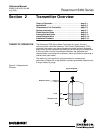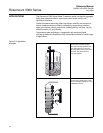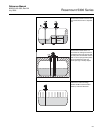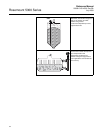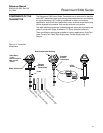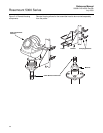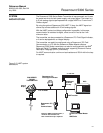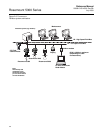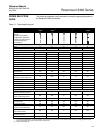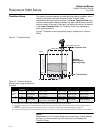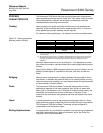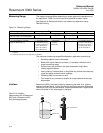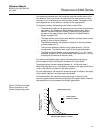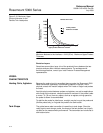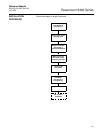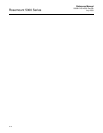
Reference Manual
00809-0100-4530, Rev BA
July 2009
2-9
Rosemount 5300 Series
PROBE SELECTION
GUIDE
The following guidelines should be used to choose the appropriate probe for
the Rosemount 5300 transmitter:
Table 2-1. Probe selection guide.
Rigid Single
Lead
Flexible Single
Lead
Coaxial Rigid Twin Lead Flexible Twin
Lead
G=Good
NR=Not Recommended
AD=Application Dependent
(consult your local Emerson
Process Management
representative)
Measurements
Level G G G G G
Interface (liquid/liquid) G G G G G
Process Medium Characteristics
Changing density G G G G G
Changing dielectric
(1)
GGGGG
Wide pH variations G G G G G
Pressure changes G G G G G
Temperature changes G G G G G
Condensing vapors G G G G G
Bubbling/boiling surfaces G AD G G G
Foam (mechanical avoidance) NR NR AD NR NR
Foam (top of foam measurement) AD AD NR AD AD
Foam (foam and liquid
measurement)
AD AD NR AD AD
Clean liquids G G G G G
Liquid with very low dielectric
constants, see also Table 2-4.
GG
(2)
GGG
(2)
Coating/sticky liquids AD AD NR NR NR
Viscous liquids AD G NR AD AD
Crystallizing liquids AD AD NR NR NR
Solids, granules, powders AD G NR NR NR
Fibrous liquids G G NR NR NR
Tank Environment Considerations
Probe is close (<12 in./30 cm) to
tank wall / disturbing objects
AD AD G G G
Probe might touch tank wall,
nozzle or disturbing objects
NR NR G NR NR
Turbulence G AD G G AD
Turbulent conditions causing
breaking forces
NR AD NR NR AD
Tall, narrow nozzles AD AD G AD AD
Angled or slanted surface
(viscous or solids materials)
G G NR AD AD
Liquid or vapor spray might touch
probe above surface
NR NR G NR NR
Disturbing Electromagnetic
interference in tank
AD AD G AD AD
Cleanability of probe G G NR AD AD
(1) For overall level applications, a changing dielectric has no effect on the measurement. For interface measurements, a changing dielectric for the
top fluid will degrade the accuracy of the interface measurement.
(2) Limited measuring range.



